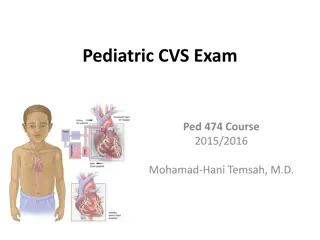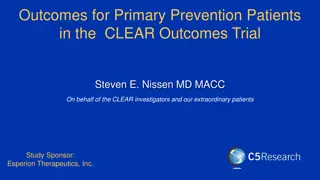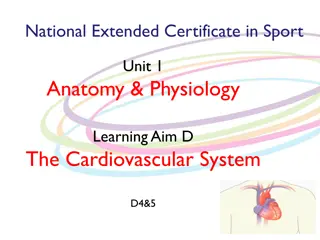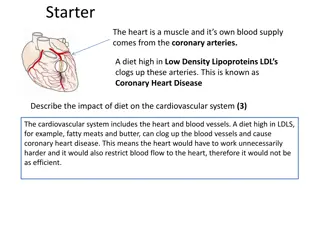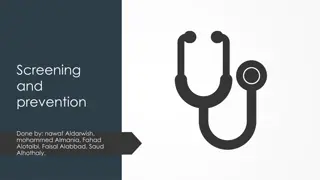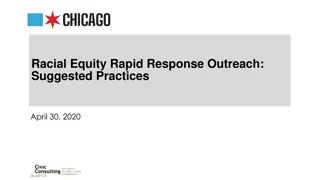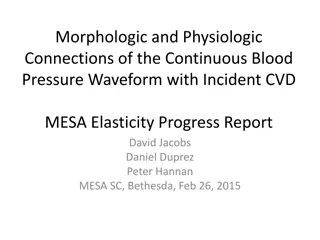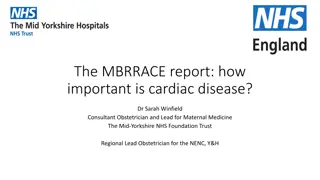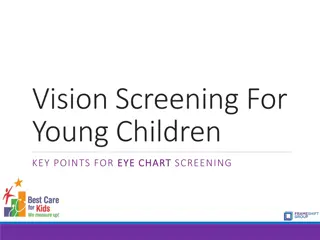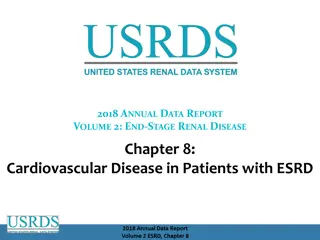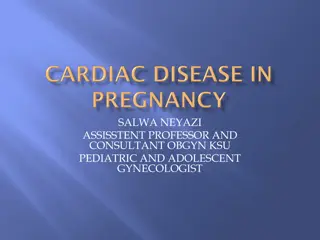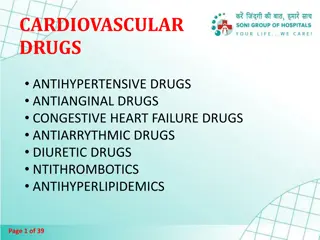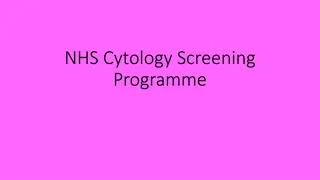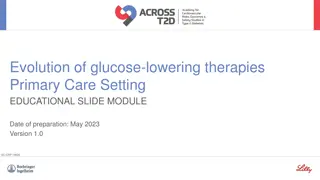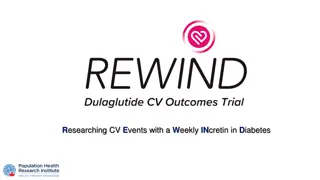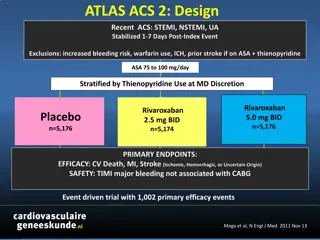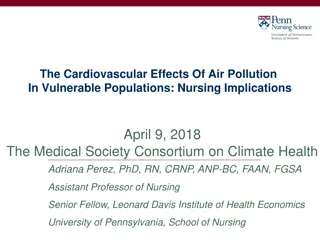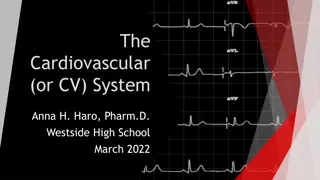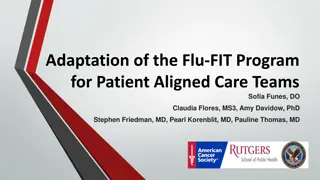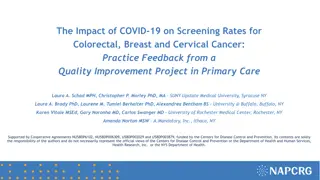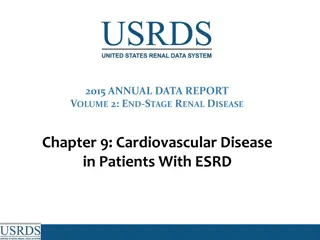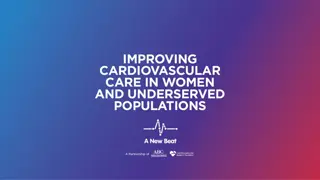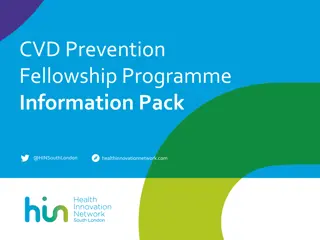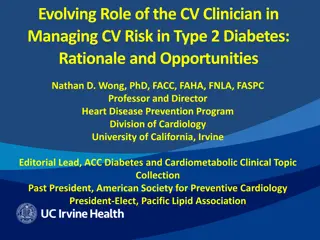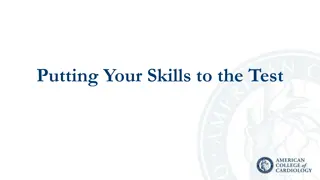Inflammation and Cholesterol Predicting Cardiovascular Events
This study explores how inflammation and cholesterol levels predict cardiovascular events among 13,970 statin-intolerant patients in the CLEAR Outcomes trial. Findings suggest residual inflammatory risk may be a stronger predictor than residual cholesterol risk for future events. The research analyz
0 views • 17 slides
Understanding Newborn Screening in Oklahoma
Newborn screening in Oklahoma is crucial for detecting hidden disorders in newborns that may not be apparent at birth. Early detection through screening can lead to timely treatment, ensuring healthy development and potentially saving lives. The process involves testing every newborn for harmful con
1 views • 88 slides
Patient Screening and Workflow Process Optimization
The flowcharts and descriptions detail the steps involved in identifying eligible patients for screening, managing patient flow during visits, and tracking screening results. The process includes reviewing patient charts, determining screening eligibility, discussing screening options with patients,
2 views • 5 slides
Insights from the REPRIEVE Trial for Managing Cardiovascular Risk in Patients with HIV
Cardiovascular disease is a growing concern in individuals living with HIV, despite advancements in treatment. The REPRIEVE Trial sheds light on the importance of assessing cardiovascular risk and implementing primary prevention measures in this population. Dr. Grinspoon's financial disclosures and
0 views • 35 slides
Understanding Lung Cancer Screening Programs and Criteria
Screening for lung cancer is essential for early detection and intervention. CT scans have shown promise in reducing mortality rates, especially in high-risk populations. While challenges like cost and radiation risk exist, initiatives like the National Lung Screening Trial have demonstrated the eff
4 views • 28 slides
Screening for Malnutrition with MUST Tool
Understanding malnutrition is crucial for maintaining optimal health. Screening with the Malnutrition Universal Screening Tool (MUST) is essential to identify individuals at risk. This tool involves assessing BMI, calculating weight loss scores, and determining overall malnutrition risk. Proper scre
5 views • 25 slides
The REPRIEVE Trial: Developing Cardiovascular Disease Prevention Strategy for People Living with HIV
The REPRIEVE trial focuses on developing a cardiovascular disease prevention strategy for individuals living with HIV. It addresses the increased risk of CVD in this population, even with good viral suppression. The study evaluates the use of pitavastatin, a statin with anti-inflammatory properties,
1 views • 33 slides
Pediatric Cardiovascular Exam Overview
Explore the differences between pediatric and adult cardiovascular exams, highlighting key differences in disease patterns, examination approaches, and objectives. Learn about the importance of distinguishing between routine well-baby exams and evaluations of ill children, along with step-by-step gu
6 views • 24 slides
CLEAR Outcomes Trial: Bempedoic Acid for Cardiovascular Prevention
The CLEAR Outcomes Trial investigated the effects of bempedoic acid, an ATP citrate lyase inhibitor, on cardiovascular outcomes in primary prevention patients. Results showed a reduction in cardiovascular events with bempedoic acid, particularly in patients intolerant to statins. Baseline characteri
0 views • 13 slides
Effects of Exercise on the Cardiovascular System
Exploring the immediate and long-term effects of exercise on the cardiovascular system reveals the remarkable adaptations and responses the body undergoes. From short-term increases in heart rate and blood pressure to long-lasting changes in cardiac output, exercise plays a crucial role in enhancing
0 views • 13 slides
Understanding Sanction Regime Framework and Screening Controls
The presented content illustrates the sanction regime framework and screening controls, highlighting the significance of sanctions, who should be screened, and what should be included in the screening process. It covers the scope of sanctions, the importance of sanction screening, tools used for scr
3 views • 42 slides
Impact of Diet on Cardiovascular Health
The impact of diet on the cardiovascular system is significant, with a high intake of LDL leading to clogged arteries and increased risk of Coronary Heart Disease. Regular exercise brings about positive changes in the cardiovascular system, enhancing heart function and oxygen delivery. Immediate ben
0 views • 7 slides
Comprehensive Guide to Screening and Prevention in Family Medicine
This comprehensive guide explores the definitions, uses, and levels of screening and prevention in family medicine. It covers the criteria for screening tests, types of screening, examples of targeted populations, and approaches to preventing common problems in primary care. The content discusses th
0 views • 73 slides
Prostate Cancer Screening Guidelines in Canada: A Snapshot of Strategies
The Canadian Partnership Against Cancer annually collects and summarizes data on national, provincial, and territorial prostate cancer screening guidelines and strategies. Despite the absence of organized screening programs, some provinces have policies in place, with opportunistic screening by prim
0 views • 13 slides
Best Practices for Racial Equity Rapid Response Outreach
This document outlines suggested practices for a racial equity rapid response outreach program, focusing on a workflow for patient outreach, prioritizing patients based on specific criteria, and components of screening including wellness checks and screening for chronic medical conditions. The workf
0 views • 6 slides
Morphologic and Physiologic Connections in Blood Pressure Waveforms for Cardiovascular Event Prediction
This report discusses the morphologic and physiologic connections in continuous blood pressure waveforms and their association with incident cardiovascular events. The study aims to assess if changes in arterial elasticity contribute to predicting CVD events and explores additional measures derived
0 views • 30 slides
The Importance of Addressing Cardiovascular Disease in Maternal Health
Cardiovascular disease remains a significant contributor to maternal mortality in the UK, with maternal deaths from cardiac issues outnumbering those from other direct causes, except thrombosis. The prevalence of cardiovascular risk factors in pregnant women, combined with a lack of consideration fo
0 views • 22 slides
Importance of Vision Screening for Young Children
Understanding the critical development of vision in young children is crucial, as vision conditions can go undetected but have significant impacts. Early screening helps in identifying refractive errors, amblyopia, and strabismus for successful treatment. Prevalence statistics highlight the importan
0 views • 23 slides
Prevalence of Cardiovascular Disease in Adult ESRD Patients: 2016 Data Report
The data report examines the prevalence of cardiovascular diseases in adult End-Stage Renal Disease (ESRD) patients in 2016 by treatment modality and age. It includes information on various cardiovascular conditions such as atrial fibrillation, acute myocardial infarction, coronary artery disease, a
2 views • 25 slides
Understanding Cardiovascular Changes in Pregnancy
This informative content discusses the normal physiological changes of the cardiovascular system in pregnancy, symptoms and signs of cardiovascular disease, the impact of pregnancy on cardiovascular health, and the management of cardiovascular issues during pregnancy, labor, and the postpartum perio
0 views • 28 slides
Implementing Pulse Oximetry Screening for CCHD in Indiana
Indiana implemented pulse oximetry screening for Critical Congenital Heart Disease (CCHD) for all newborns as mandated by state law. The legislation, effective from January 1, 2012, requires every newborn in Indiana to receive CCHD screening, with exceptions only for religious beliefs. The state wor
0 views • 13 slides
Understanding Cardiovascular Drugs: An Overview of Treatment Options
Explore the world of cardiovascular drugs, including antihypertensive, antianginal, heart failure, antiarrhythmic, diuretic, antithrombotic, and antihyperlipidemic medications. Dive into the mechanisms of action, clinical indications, and adverse effects of these drugs, gaining valuable insights int
0 views • 39 slides
Enhancing Cervical Cancer Screening through NHS Cytology Programme
The NHS Cytology Screening Programme aims to reduce incidence and mortality from cervical cancer by offering systematic, efficient screening for pre-malignant diseases. With a history dating back to 1988, the programme targets women aged 25-64, emphasizing the importance of visualizing the cervix an
1 views • 38 slides
Screening and Prevention in Family Practice
Definition of screening and prevention in family practice along with the Wilson-Jungner criteria, types of screening tests, and examples like colonoscopy and breast cancer screening. Objectives include understanding screening types and targeted populations, pros and cons of screening, and appropriat
0 views • 33 slides
Understanding Women's Health: Risks, Prevention, and Care
Women's health encompasses the screening, diagnosis, and management of diseases and conditions affecting physical and emotional well-being. Services are provided by a diverse team of healthcare professionals specializing in obstetrics, gynecology, surgery, and primary care. Cardiovascular disease is
0 views • 46 slides
Evolution of Glucose-Lowering Therapies in Primary Care Settings
Cardiovascular effects of older glucose-lowering therapies and the history of cardiovascular outcome trials are discussed in this educational slide module. It outlines the timeline of treatment options from the discovery of insulin to the introduction of various medications. Evidence regarding the c
0 views • 29 slides
Investigating the Impact of Weekly Incretin on Cardiovascular Events in Diabetes
Individuals with type 2 diabetes have an increased risk of cardiovascular events compared to those without the condition. Research indicates that certain GLP-1 receptor agonists have shown promising results in reducing cardiovascular events in diabetic patients with specific HbA1c levels. However, t
0 views • 69 slides
Clinical Trial Results of Rivaroxaban in ACS Patients: ATLAS-ACS 2 Study
The ATLAS-ACS 2 study investigated the efficacy and safety of rivaroxaban in ACS patients post-index event. The primary endpoints included cardiovascular death, MI, and stroke, with significant reductions seen with rivaroxaban compared to placebo. Stent thrombosis was also reduced with rivaroxaban t
0 views • 10 slides
GripTrack: Innovative Device for Monitoring Elderly Health
GripTrack is a portable grip strength monitoring device designed to track cardiovascular and musculoskeletal health in the elderly population. It aims to provide an accurate early warning system by assessing grip strength, which can indicate cognitive decline, cardiovascular health, and frailty synd
0 views • 14 slides
Understanding Disease Screening and Prevention in Medicine
Explore the concepts of disease screening and prevention in preventive medicine. Learn about the importance of recognizing preclinical cases, the iceberg phenomenon of disease, and the role of medical intervention in arresting disease progression. Discover when to apply screening, the types of scree
0 views • 36 slides
Understanding the Cardiovascular Effects of Air Pollution in Vulnerable Populations
This presentation discusses the significant cardiovascular effects of air pollution, particularly on vulnerable populations such as older adults, women, and Latinos. It highlights the environmental factors contributing to cardiovascular health disparities and emphasizes the nursing implications for
0 views • 13 slides
Overview of Cervical Cancer Screening Programs in Canada
The Canadian Partnership Against Cancer conducts an annual environmental scan on cervical cancer screening guidelines and strategies across the country. Organized screening programs are available in most provinces, offering services to asymptomatic women at average risk. This scan provides insights
1 views • 46 slides
Understanding the Cardiovascular System: Anatomy, Physiology, and Function
Explore the intricate workings of the cardiovascular system, encompassing the heart, blood vessels, and blood circulation. Learn the anatomy, physiology, and function of this vital system, including the roles of arteries, veins, capillaries, and red and blue blood. Understand how the cardiovascular
0 views • 23 slides
Implementation of Flu-FIT Program for Patient Aligned Care Teams at East Orange VA
This study details the adaptation of the Flu-FIT Program to enhance colorectal cancer screening rates within patient aligned care teams at the Veterans Affairs (VA) Department. By linking influenza immunization with colorectal cancer screening using fecal immunochemical testing, the project aimed to
0 views • 10 slides
Impact of COVID-19 on Cancer Screening Rates in Primary Care
This study examines the impact of the COVID-19 pandemic on colorectal, breast, and cervical cancer screening rates in safety-net primary care practices. A 7-year Quality Improvement Project aimed to increase screening rates through tailored education and practice facilitation. The project faced chal
0 views • 5 slides
Cardiovascular Disease in End-Stage Renal Disease Patients: Data Analysis 2011-2013
Understanding the prevalence and causes of cardiovascular diseases in patients with End-Stage Renal Disease (ESRD) is crucial for effective management. This report analyzes data from 2011-2013, focusing on the causes of death in ESRD patients, prevalence of cardiovascular diseases by treatment modal
0 views • 18 slides
Insights on Cardiometabolic Risk Reduction and Diabetes Treatment in 2019
Cardiologists in 2019 must address the significant cardiovascular risks associated with diabetes mellitus. Dr. Keith C. Ferdinand highlights the increased rates of heart disease, stroke, and heart failure in patients with diabetes. Despite advancements, cardiovascular risk management remains subopti
0 views • 10 slides
Cardiovascular Disease Prevention Fellowship Programme Information Pack
The Cardiovascular Disease Prevention Fellowship Programme by Health Innovation Network offers a comprehensive 7-month program for healthcare professionals to enhance their skills in cardiovascular disease prevention. The program includes clinical webinars, improvement collaborative sessions, and qu
0 views • 14 slides
The Evolving Role of Cardiovascular Clinicians in Managing Type 2 Diabetes Risk
The role of cardiovascular clinicians in managing cardiovascular risk in patients with type 2 diabetes is evolving, with a growing emphasis on collaboration with multidisciplinary teams. Recognizing the potential benefits of certain diabetes medications on cardiovascular outcomes, clinicians are urg
0 views • 25 slides
Understanding PCSK9 Inhibitors for Cardiovascular Health
PCSK9 inhibitors are a novel class of medications that help lower LDL cholesterol levels, reducing the risk of cardiovascular events. This article covers their mechanism of action, patient groups benefiting from them, efficacy in LDL-C lowering, and safety considerations. Learn how PCSK9 inhibitors
0 views • 8 slides







